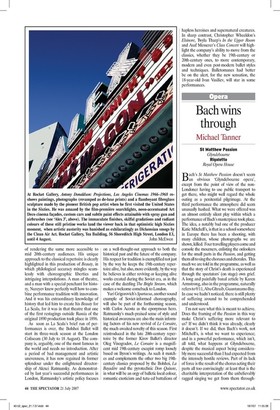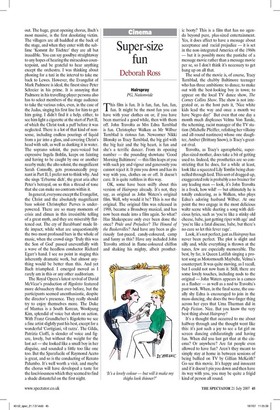Bach wins through Michael Tanner St Matthew Passio
Bach wins through Michael Tanner St Matthew Passion Glyndeboume Rigoletto Royal Opera House Bach's St Matthew Passion doesn't seem an obvious `Glyndebourne opera', except from the point of view of the nonLondoner having to use public transport to get there, who might well regard the whole outing as a penitential pilgrimage. At the third performance the atmosphere did seem unusually hushed. What we were offered was an almost entirely silent play within which a performance of Bach's masterpiece took place. The idea, a notably bad one of the producer Katie Mitchell's, is that in a school somewhere in Europe there has been a shooting, with many children, whose photographs we are shown, killed. Four travelling players come and console the mourners, enlisting the onlookers for the small parts in the Passion, and getting them all to sing the choruses and chorales. This much we are told in the programme, as well as that the story of Christ's death is experienced through the spectators' (on stage) own grief. A long and painfully banal article by Karen Armstrong, also in the programme, naturally refers to 9/11, Abu Ghraib, Guantanamo Bay. In case we hadn't noticed, there is still plenty of suffering around to be comprehended and understood.
I'm not sure what this is meant to achieve. Does the framing of the Passion in this way make Christ's suffering more relevant to us? If we didn't think it was already, clearly it doesn't. If we did, then Bach's work, not Mitchell's, is what we want to experience; and in a powerful performance, which isn't, all told, what happens at Glyndebourne, despite the musical aspect being considerably more successful than I had expected from the intensely hostile reviews. Part of its lack of force is the result of the chorus acting their parts all too convincingly: at least that is the charitable interpretation of the unbelievably ragged singing we get from them throughout. The huge, great opening chorus, Bach's most massive, is the first desolating victim. The villagers are all huddled at the back of the stage, and when they enter with the sublime `Kommt ihr Tochtef they are all but inaudible. You can say goodbye straightaway to any hopes of hearing the miraculous counterpoint, and be grateful to hear anything except the orchestra. I was thinking about phoning for a taxi in the interval to take me back to Lewes. However, the Evangelist of Mark Padmore is ideal, the finest since Peter Schreier in his prime. It is annoying that Padmore in his travelling-player persona also has to select members of the stage audience to take the various roles, even, in the case of the Judas, singing his first line for him to get him going. I didn't find it a help, either, to see him light a cigarette at the start of Part II, of which the Christ took a puff before it was neglected. There is a lot of that kind of nonsense, including endless pourings of liquid from a jar into a glass, and covering Christ's head with salt, as well as dunking it in water. The soprano soloist, the pure-voiced but expressive Ingela Bohlin, keeps on fainting and having to be caught by one or another nearby male; the alto soloist, the magnificent Sarah Connolly, gets pronouncedly pregnant in Part II, I prefer not to think why. And she sings `Erbarme dich', the great aria after Peter's betrayal, on so thin a thread of tone that she can make no contrasts within it.
In general, everyone except the Evangelist, the Christ and the absolutely magnificent bass soloist Christopher Purves is underpowered. There are so many moments of crisis and climax in this irresistible telling of a great myth, and they are miserably flattened out. The cry of Barabbam! made little impact; while what are unquestionably the two most profound bars in the whole of music, when the crowd sings 'Truly this was the Son of God' passed uneventfully with a wave of the heedless conductor Richard Egarr's hand. I see no point in staging this inherently dramatic work, but almost anything would be better than this. And yet Bach triumphed. I emerged moved as I rarely am in this or any other auditorium.
The Royal Opera's latest revival of David McVicar's production of Rigoletto featured more debauchery than ever before, but the participants seemed unenthusiastic, despite the director's presence. They really should try to enjoy themselves more. The Duke of Mantua is a South Korean, Wookyung Kim, splendid of voice but short on action. With Franz Grundheber's Rigoletto we see a fine artist slightly past his best, except for a wonderful `Cortigiani, vil razza'. The Gilda, Patrizia Cioffi, is slender of voice and figure, lovely, but without the weight for the last act — she looked like a small boy in her disguise, and sounded a little too like one too. But the Sparafucile of Raymond Aceto is great, and so is the conducting of Renato Palumbo. It's well worth a visit, and maybe the chorus will have developed a taste for the lasciviousness which they seemed to find a shade distasteful on the first night.













































 Previous page
Previous page